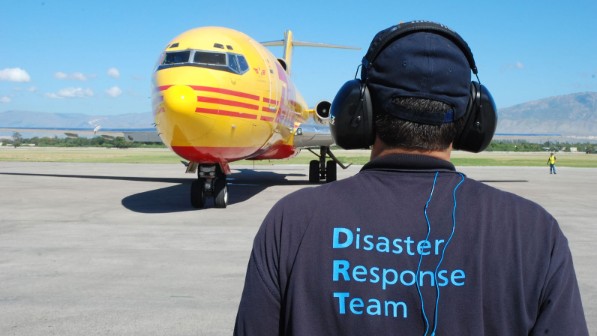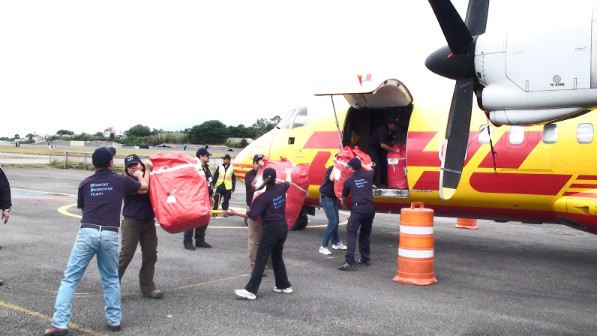Disaster Response
In cooperation with the United Nations Office for the Coordination of Humanitarian Affairs (UNOCHA), we have established a global network consisting of around 1,000 specially trained employees who volunteer their time to be a part of our Disaster Response Teams (DRT). There are DRTs for the Americas, the Middle East/Africa and Asia Pacific regions. When called up by the United Nations after a disaster, DRTs can be on the ground and operational at a disaster-site airport within 72 hours.

In close cooperation with the worldwide humanitarian system, DRT members assume various logistics responsibilities all on a volunteer basis. They unload air freight palettes, warehouse relief supplies, conduct inventory and make sure that the incoming supplies are received by the appropriate relief organizations in an orderly fashion.
We must unfortunately deny any request of free shipping to affected regions. The situation at an airport following a major disaster is rather hectic. Therefore, individual and unsolicited packages arriving in the area can create a bottleneck at the airport and slow down the relief process. If you want to support affected areas, we encourage you to donate money to large, internationally-operating aid agencies. Financial support is often the best way to help immediately as it does not slow down the flow of relief aid.
Origins
On 26 December 2003, an earthquake measuring 6.6 on the Richter scale struck the Iranian city of Bam, leaving the majority of buildings badly damaged. In the immediate aftermath of the quake, DHL Group was able to quickly mobilize its network and fly relief supplies into Bam Airport.
As the airport's infrastructure was not designed to cope with the sudden rise of incoming relief supplies, major logistical challenges soon led to the airport shutting down. It was at Bam Airport that DHL Group employees realized they could use our expertise in logistics, our global network and our employees’ commitment to support people in need around the world.
We cooperate to help
For the Disaster Response Teams, we cooperate with the United Nations Office for the Coordination of Humanitarian Affairs (OCHA) with whom we have a close and trusting strategic partnership.
OCHA is responsible for mobilizing and coordinating humanitarian aid with national and international partners. The organization calls on the DRT when disasters strike. A Memorandum of Understanding, which is signed upon deployment, regulates the cooperation with local government offices.
Areas of operation
The global DRT network consists of three regional relief hubs that have been chosen strategically to cover 80% of the world’s disaster hot-spots. One team is stationed in Singapore for operations in Asia Pacific. A second team, the DRT Americas in Panama, provides its services to the Latin American and Caribbean regions, while a third team is based in Dubai and covers the Middle East and Africa.
We ensure deployment readiness with regular trainings
We provide our DRT volunteers with intensive training to make sure they are prepared for the extraordinary demands of such deployments. As part of the training, DRT volunteers are familiarized with various aspects of disaster relief and management. Around 100 employees are trained annually for disaster response deployments, and at least one exercise a year is conducted in each of the three DRT deployment regions.
DHL Speedballs
Once relief goods have arrived at the airport, the shipments are repacked by DRT volunteers for storage in temporary warehouses and for distribution mostly by truck. To distribute urgently needed items such as health supplies, drinking water and food, however, DRT team members came up with the idea of using DHL shipping bags to distribute aid fast.
DRT teams sort urgent supplies into hundreds of polypropylene bags to create DHL Speedballs. When lands are flooded or roads have become impassable, the bundles can be loaded onto helicopters and flown directly into the inundated areas, where they are thrown into the water close to the people in need.

Memorandum of Understanding
We have bilateral Memoranda of Understanding (MoU) in place with several countries in disaster-prone regions. The MoU includes, for example, provisions governing the entry of our DRT volunteers into the respective country. These signed agreements facilitate and significantly accelerate any disaster-related deployments to those countries. In addition, the MoU allows the respective government to make a direct request for DRT deployment.
